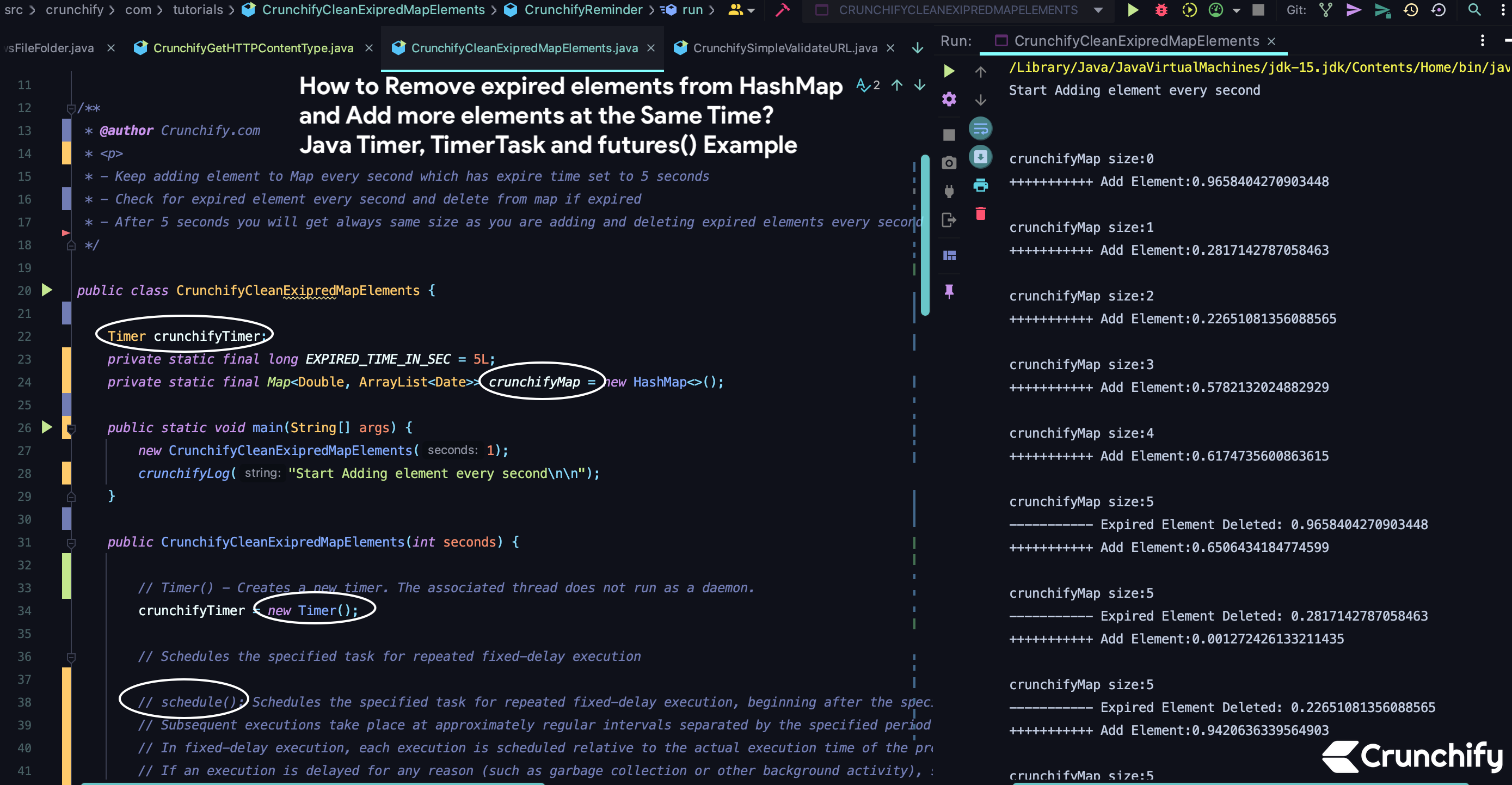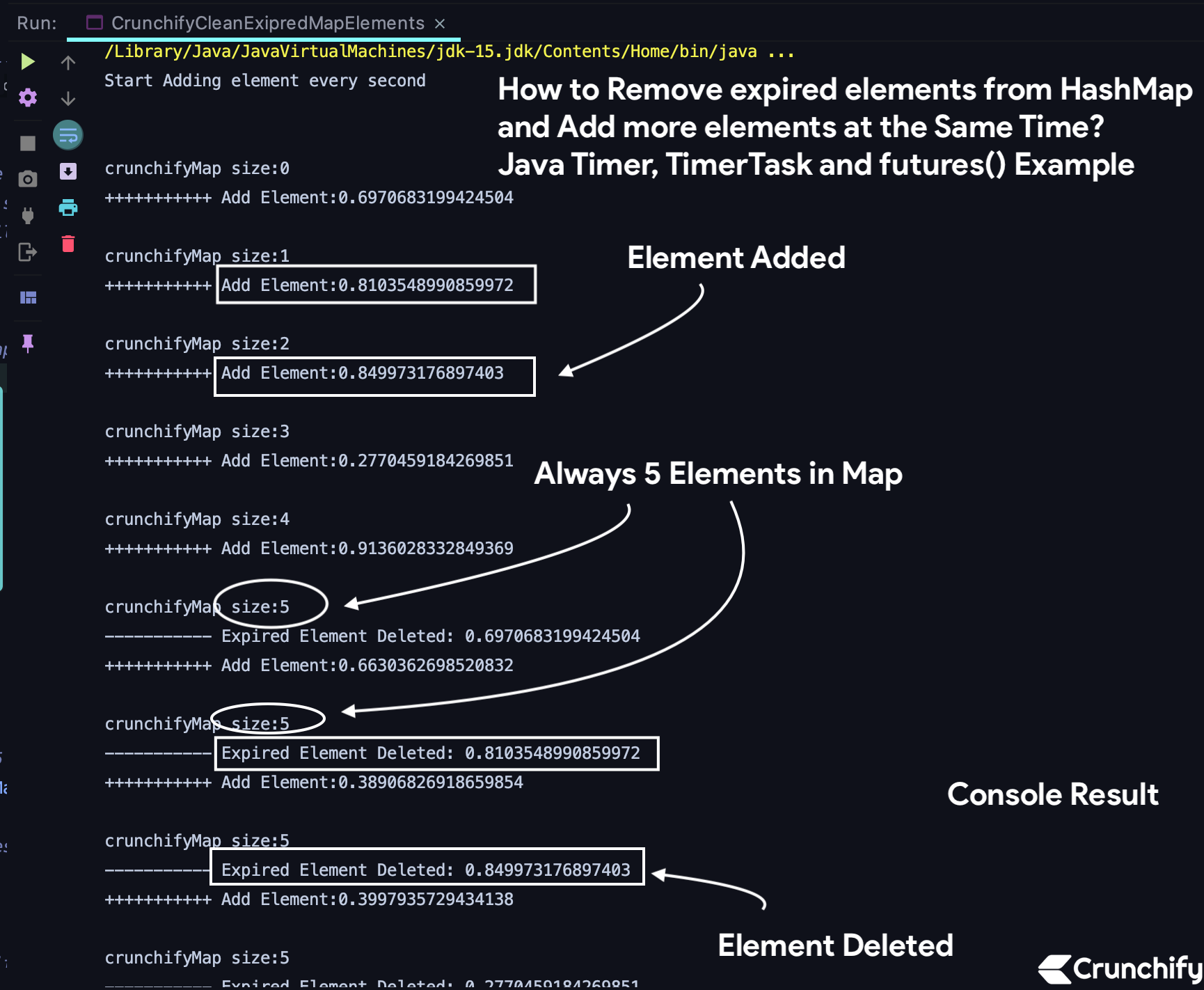So entfernen Sie abgelaufene Elemente aus HashMap und fügen gleichzeitig weitere Elemente hinzu – Java Timer, TimerTask und futures() – Vollständiges Beispiel
Veröffentlicht: 2021-04-02
Hashmap, ArrayList, Static Map, Vectors usw. sind die am häufigsten verwendeten Java-Collection-Framework-Elemente. Es gibt unendlich viele Szenarien, in denen Sie dies je nach Bedarf verwenden können.
Dieses Beispiel ist ein sehr interessantes Java-Beispiel. Wir werden die folgende Operation an einer einzelnen HashMap() ausführen.
- Erstellen Sie ein crunchifyMap-Objekt
- Fügen Sie jede Sekunde ein Element zur Karte hinzu, dessen Ablaufzeit auf
5 secondseingestellt ist -
Checkjede Sekunde nach abgelaufenen Elementen wie Cache unddelete from map if expired - Nach 5 Sekunden erhalten Sie
always same sizeundalways 5 elementsda Sie jede Sekunde abgelaufene Elemente hinzufügen und löschen
Auch wenn Sie folgende below questions haben, dann sind Sie hier richtig:
- Was ist ein passives ablaufendes Kartenbeispiel
- Concurrent Map mit Timeout-Element
- Beispiel für eine Java-Cache-Zuordnung
- Java TimerTask-Beispiel
- Evictor – ein Beispiel für eine Java Concurrent Map
Lass uns anfangen:
Punkt 1
- Erstellen Sie das Timer-Element
crunchifyTimer - Plant die angegebene Aufgabe
CrunchifyReminder()für die wiederholte Ausführung mit fester Verzögerung, die 1 Sekunde beträgt - In geplanter Aufgabe
- Element in crunchifyMap
add - auf abgelaufenes Element von crunchifyMap prüfen und löschen
- Element in crunchifyMap
Punkt-2
- Während der Operation
addElement()- Wir ordnen jedem Element die
current timezu
- Wir ordnen jedem Element die
- Während der Operation
crunchifyClearExipredElementsFromMap()- Wir prüfen die aktuelle Zeit mit der Zeit des Elements
- Wenn der Zeitunterschied mehr als 5 Sekunden beträgt, löschen Sie einfach das Element aus crunchifyMap
Punkt-3
- Während des Hinzufügens und Entfernens wird das Element auf der Eclipse-Konsole gedruckt
- Das erste hinzugefügte Element wird zuerst entfernt und so weiter
- Bitte überprüfen Sie die Ausgabe der Eclipse-Konsole auf das Ergebnis
Hier ist ein Java-Programm:
|
1 2 3 4 5 6 7 8 9 10 11 12 13 14 15 16 17 18 19 20 21 22 23 24 25 26 27 28 29 30 31 32 33 34 35 36 37 38 39 40 41 42 43 44 45 46 47 48 49 50 51 52 53 54 55 56 57 58 59 60 61 62 63 64 65 66 67 68 69 70 71 72 73 74 75 76 77 78 79 80 81 82 83 84 85 86 87 88 89 90 91 92 93 94 95 96 97 98 99 100 101 102 103 104 105 106 107 108 109 110 111 112 113 114 115 116 117 118 119 120 121 122 |
package crunchify . com . tutorials ; import java . util . ArrayList ; import java . util . Date ; import java . util . HashMap ; import java . util . Iterator ; import java . util . Map ; import java . util . Map . Entry ; import java . util . Timer ; import java . util . TimerTask ; /** * @author Crunchify.com * <p> * - Keep adding element to Map every second which has expire time set to 5 seconds * - Check for expired element every second and delete from map if expired * - After 5 seconds you will get always same size as you are adding and deleting expired elements every second */ public class CrunchifyCleanExipredMapElements { Timer crunchifyTimer ; private static final long EXPIRED_TIME_IN_SEC = 5L ; private static final Map < Double , ArrayList < Date > > crunchifyMap = new HashMap < > ( ) ; public static void main ( String [ ] args ) { new CrunchifyCleanExipredMapElements ( 1 ) ; crunchifyLog ( "Start Adding element every second\n\n" ) ; } public CrunchifyCleanExipredMapElements ( int seconds ) { // Timer() - Creates a new timer. The associated thread does not run as a daemon. crunchifyTimer = new Timer ( ) ; // Schedules the specified task for repeated fixed-delay execution // schedule(): Schedules the specified task for repeated fixed-delay execution, beginning after the specified delay. // Subsequent executions take place at approximately regular intervals separated by the specified period. // In fixed-delay execution, each execution is scheduled relative to the actual execution time of the previous execution. // If an execution is delayed for any reason (such as garbage collection or other background activity), subsequent executions will be delayed as well. // In the long run, the frequency of execution will generally be slightly lower than the reciprocal of the specified period (assuming the system clock underlying Object.wait(long) is accurate). crunchifyTimer . schedule ( new CrunchifyReminder ( ) , 0 , seconds * 1000L ) ; } // TimeTask: A task that can be scheduled for one-time or repeated execution by a Timer. // A timer task is not reusable. Once a task has been scheduled for execution on a Timer or cancelled, // subsequent attempts to schedule it for execution will throw IllegalStateException. class CrunchifyReminder extends TimerTask { public void run ( ) { // We are checking for expired element from map every second crunchifyClearExpiredElementsFromMap ( ) ; // We are adding element every second addElement ( ) ; } } public void addElement ( ) { crunchifyAddElementToMap ( Math . random ( ) ) ; } // Check for element's expired time. If element is > 5 seconds old then remove it private static void crunchifyClearExpiredElementsFromMap ( ) { // Date() - Allocates a Date object and initializes it so that it represents the time at which it was allocated, measured to the nearest millisecond. Date currentTime = new Date ( ) ; Date actualExpiredTime = new Date ( ) ; // if element time stamp and current time stamp difference is 5 second then delete element actualExpiredTime . setTime ( currentTime . getTime ( ) - EXPIRED_TIME_IN_SEC * 1000L ) ; // size() - Returns the number of key-value mappings in this map. If the map contains more than Integer.MAX_VALUE elements, returns Integer.MAX_VALUE. System . out . println ( "crunchifyMap size:" + CrunchifyCleanExipredMapElements . crunchifyMap . size ( ) ) ; Iterator < Entry < Double , ArrayList < Date > > > crunchifyIterator = CrunchifyCleanExipredMapElements . crunchifyMap . entrySet ( ) . iterator ( ) ; // hasNext() - Returns true if the iteration has more elements. (In other words, returns true if next would return an element rather than throwing an exception.) while ( crunchifyIterator . hasNext ( ) ) { // next() - Returns the next element in the iteration. Entry < Double , ArrayList < Date > > entry = crunchifyIterator . next ( ) ; // getValue() - Returns the value corresponding to this entry. // If the mapping has been removed from the backing map (by the iterator's remove operation), the results of this call are undefined. ArrayList < Date > crunchifyElement = entry . getValue ( ) ; while ( crunchifyElement . size ( ) > 0 && crunchifyElement.get(0).compareTo(actualExpiredTime) < 0) { crunchifyLog("----------- Expired Element Deleted: " + entry.getKey()); crunchifyElement . remove ( 0 ) ; } if ( crunchifyElement . size ( ) == 0 ) { // remove() - Removes from the underlying collection the last element returned by this iterator (optional operation). // This method can be called only once per call to next. crunchifyIterator . remove ( ) ; } } } // Adding new element to map with current timestamp private static void crunchifyAddElementToMap ( Double digit ) { ArrayList < Date > crunchifyList = new ArrayList < > ( ) ; CrunchifyCleanExipredMapElements . crunchifyMap . put ( digit , crunchifyList ) ; // add() - Appends the specified element to the end of this list. crunchifyList . add ( new Date ( ) ) ; crunchifyLog ( "+++++++++++ Add Element:" + digit + "\n" ) ; } private static void crunchifyLog ( String string ) { System . out . println ( string ) ; } } |
Ausgabe der Eclipse-Konsole:
Führen Sie einfach das obige Programm aus und Sie sollten das Ergebnis wie unten sehen.


|
1 2 3 4 5 6 7 8 9 10 11 12 13 14 15 16 17 18 19 20 21 22 23 24 25 26 27 28 29 30 31 32 33 34 35 |
Start Adding element every second crunchifyMap size : 0 +++++++++++ Add Element : 0.6970683199424504 crunchifyMap size : 1 +++++++++++ Add Element : 0.8103548990859972 crunchifyMap size : 2 +++++++++++ Add Element : 0.849973176897403 crunchifyMap size : 3 +++++++++++ Add Element : 0.2770459184269851 crunchifyMap size : 4 +++++++++++ Add Element : 0.9136028332849369 crunchifyMap size : 5 ----------- Expired Element Deleted : 0.6970683199424504 +++++++++++ Add Element : 0.6630362698520832 crunchifyMap size : 5 ----------- Expired Element Deleted : 0.8103548990859972 +++++++++++ Add Element : 0.38906826918659854 crunchifyMap size : 5 ----------- Expired Element Deleted : 0.849973176897403 +++++++++++ Add Element : 0.3997935729434138 crunchifyMap size : 5 ----------- Expired Element Deleted : 0.2770459184269851 +++++++++++ Add Element : 0.20373441843273887 Process finished with exit code 130 ( interrupted by signal 2 : SIGINT ) |
Lassen Sie mich wissen, wenn Sie auf ein Problem stoßen, das über dem Java-Programm ausgeführt wird.
